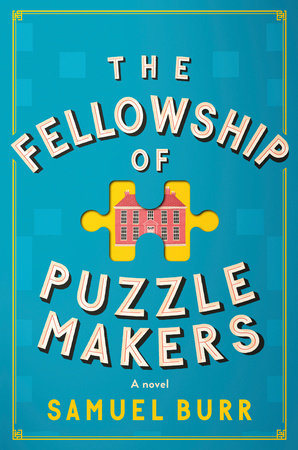Reading Group Center
- Home •
- Books by Category •
- Imprints •
- News •
- Videos •
- Media Center •
- Reading Group Center
The Fellowship of Puzzlemakers
By Samuel Burr
Right up until her death at age ninety-two, life was a fabulous puzzle for crossword doyenne Pippa Allsbrook. The missing piece was Clayton. He’s the infant she found tucked in a hatbox twenty-five years earlier and raised among the brainiest, quirkiest extended family a boy could imagine: the riddlers, jigsaw artists, maze designers, and codebreakers in Pippa’s collective, the Fellowship of Puzzlemakers.
It’s so like Pippa to leave Clayton with one last puzzle: that of his own personal history and the fates that led him to the Fellowship. For Clayton, this is his chance to figure out where in the world he belongs. Clue by clue, he’s also discovering more about Pippa’s past and where his future lies. Like all great puzzles, it won’t be simple. But nothing worth solving ever is. The Fellowship of Puzzlemakers is a poignant and exuberant debut novel about finding human connections at the crosswords of life.
The following questions are designed to enrich your book club’s discussion of The Fellowship of Puzzlemakers and illuminate its themes of family, secrets, and coming of age—no matter how late that might be.
1. In Pippa’s Fellowship, she found her people. In what ways does the Fellowship mirror the communal experience and commonalities of your own reading group?
2. One of the first challenges for the Fellowship (and for readers) is the cryptogram on page 40. How many of you tried to solve it before reading on? And in what ways does the solution—In the end we only regret the chances we didn’t take—reflect the journeys of the characters?
3. On page 5, Pippa describes finding the infant Clayton as “miraculous” and a “solution she’d spent a lifetime searching for.” To what problem in Pippa’s life is his appearance a solution?
4. At first, Clayton bristles at the idea of Pippa’s game “from the beyond the grave” (on page 9) Why does Pippa think Clayton still needs to be challenged?
5. The motto of Pippa, the cryptic queen, is Veni, Vidi, Solvi—I Came, I Saw, I Solved (on page 23). That certainly sums up the Fellowship, but how does it also apply to life?
6. Though brilliantly skilled, Pippa says that in her younger years she always felt invisible. In what ways does establishing the Fellowship finally make her feel seen?
7. The puzzles, mazes, and brain games of the Fellowship aren’t just for enjoyment’s sake; they help, as Pippa says on page 31, to make “sense of the world around us.” How is that true of the word games you yourself indulge in for fun?
8. On the one hand, Clayton is intrigued about following his mother’s clues toward the discovery of his past. That’s understandable. But do you also understand his apprehension?
9. Clayton, having been raised among people considerably older than him, dresses, feels, and acts older than he is. In what ways does he still have growing up to do? Other than his biological parenthood, what aspects of life has he yet to learn and discover?
10. Operating in a man’s world, Pippa took joy in confounding people’s expectations of her. When was the last time you confounded someone else’s expectations? How did it play out for you?
11. One of the reasons for the Fellowship partaking in puzzles is the pleasure of routine. What routines do you have in your life? What are the ones you’re unconscious of? Aware of? And those you can’t imagine living without?
12. Why do you think Clayton has difficulty in making human connections? In your own life, even in this reading group, are you eager to make new connections? Or do you tend to wait for someone else to do the connecting?
13. Clue words during Clayton’s quest include adventures, appearance, dared, anger, remorse, and anew. How did they apply to Clayton in his quest?
14. Ultimately, Pippa just wanted Clayton to find a zest for life. Why did she think he’d lost it? How did she help? In what ways did Clayton help himself on his journey of self-discovery?
15. In the end, Pippa wonders if there is one clear path to happiness or, as Earl the mazemaker puts it on page 321, it’s a matter of “moving forwards or backwards, sideways even.” How true is that of Pippa’s and Clayton’s journeys?
16. Before reading the novel, were you already a “gamer”? Or were the cryptograms, word games, crosswords, mazes, and brain teasers something new for you?


